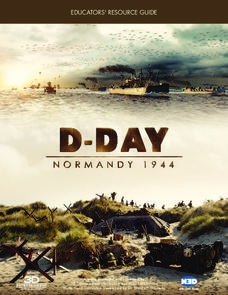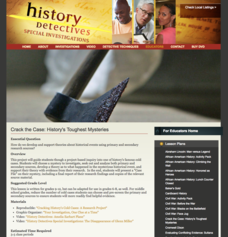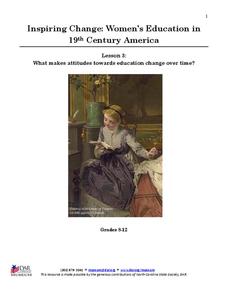PBS
Before We Travel, We Research
Context is key when it comes to historical research. Prior to field research, class members learn as much as they can about the site they are going to visit. Groups investigate and prepare presentations about the history of the site, the...
PBS
Think Like a Historian: A Viewing Guide
Calling all junior detectives! Scholars use the tools of investigation to determine the causes and impacts of the American Civil War. Using viewing guides, videos, group research, and written resources, they discover what it takes to...
PBS
Writing a Historical Poem
Students conduct field research of a historical site in order to discover a more complete understanding of a time period. They choose one particular historical figure and write a short poem about the site from the historical person's...
PBS
Going Back In Time
History detectives eschew that time machine and follow the paper trail to go back in time to investigate an unfamiliar object. The goal is for class members to develop their skills as historical detectives.
PBS
1000 Words
A picture really can speak a thousand words—no matter how old! Scholars become history detectives as they learn how to analyze historical photos and evidence to uncover the past. The fun hands-on activity makes history come alive through...
US Holocaust Museum
Time Capsule in a Milk Can
Imagine dumping out a milk can and finding letters from one of the darkest moments in history! Scholars use Holocaust Reading Passages and research to discover how people recorded and hid history during the events of World War II. They...
D-Day Normandy 1944
D-Day Normandy 1944
No study of World War II would be complete without an in-depth examination of the events of June 6, 1944. Pascal Vuong's D-Day Normandy:1944, is the perfect vehicle to convey the sheer magnitude of the events that have been called the...
Channel Islands Film
Arlington Springs Man: Lesson Plan 4
West of the West's documentary Arlington Springs Man introduces viewers to the remarkable finds on Santa Rosa Island. Archaeologist have discovered on this small island that is part of the Channel island chain, human and pygmy mammoth...
PBS
Family History: Treasure Troves
It's time for show and tell! Scholars investigate historical artifacts to determine what secrets they reveal about the time periods they represent. They then research their own personal artifacts, as well as those from World War I.
Benjamin Franklin Tercentenary
Designing Benjamin Franklin: In Search of a Better World
How do you convey someone’s creativity? Individuals answer the question as they design exhibitions to showcase the intellect and genius of Benjamin Franklin. After conducting research, classmates work in groups to try to capture and...
PBS
Crack the Case: History's Toughest Mysteries
Young sleuths don their trench coats, tip their fedoras, and grab their notepads to investigate one of four famous unsolved mysteries. After examining multiple primary and secondary sources related to their cold case, they propose a...
PBS
Civil War: Before the War
Free the slaves! Scholars research primary documents and videos while working together to create abolitionist posters. They examine the John Brown raid as a template to creating their own demonstration.
Constitutional Rights Foundation
The War of 1812: America’s First Declared War
Free Trade and Sailor's Rights! Pupils dive into America's first declared war, the War of 1812. They analyze the presidencies of Jefferson and Madison through diary entries and historical reasoning. To conclude the lesson, they use their...
Turabian Teacher Collaborative
Parts of Argument II: Article Critique
Break down the parts of argumentative writing with a critical thinking activity. High schoolers read an article of your (or their choice), and use a graphic organizer to delineate the ways the author structures his or her arguments.
PBS
Who Knows Best
Finding an expert in a given field when conducting research can be a challenge. This guide provides step-by-step directions as well as links to resources that help young sleuths find the authorities and experts they need. As a bonus, two...
PBS
Civil War: Blacks on the Battlefield
Imagine a war being fought to free slaves, with slaves on the front line. Scholars use primary documents, videos, and research in the second installment of a three-part series to guide their analysis of the first African-Americans on the...
Southern Poverty Law Center
Evaluating Online Sources
All sources are pretty much the same, right? If this is how your class views the sources they use for writing or research projects, present them with a media literacy lesson on smart source evaluation. Groups examine several articles,...
National Endowment for the Humanities
Courage “In the Time of the Butterflies”: A Common Core Exemplar
The courage of Las Mariposas, the Mirabal sisters, is the focus of a series of activities designed to accompany a reading of In the Time of the Butterflies that ask readers to consider what it means to be courageous. Beautifully crafted...
Curated OER
A Day in the Life
Learners inquire about the politics and culture of Ancient Rome. In this Ancient Rome project/unit, students research life during ancient Roman times and create a newspaper with articles on politics, sports, culture, and economics.
Smithsonian Institution
Dia de los Muertos: Honoring our Ancestors Through Community Celebration
Oral storytelling has been an important part of every culture. The time-honored practice uses stories as a conduit for a culture's values and customs from one generation to the next. Keep the tradition going with a family interview...
National Society Daughters of the American Revolution
Lesson 3: What Makes Attitudes Towards Education Change over Time?
The struggle for women's rights is not unique to this generation, or even to the 20th century. Class members explore the conflicting opinions of Alexander Graham Bell and his wife, Mabel Hubbard Bell, regarding women's pursuits of higher...
Stockton University Wordpress
Civil Disobedience: Is it ever ok to break the law?
As part of a study of civil disobedience, class members read excerpts from the writings of activists who were willing to break the law to protest unjust laws.























